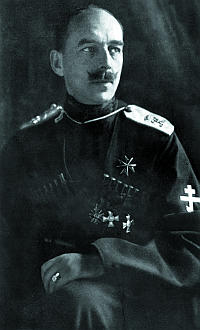Pavel Bermondt-Avalov
Contributors to Wikimedia projects
 Article Images
Article Images
Pavel Rafalovich Bermon(d)t-Avalov (Avalishvili) (Russian: Павел Рафалович Бермон(д)т-Авалов) (4 March 1877 – 27 January 1974)[1] was an Ussuri Cossack and warlord.
Pavel Bermondt-Avalov | |
|---|---|
 Pavel Bermondt-Avalov. | |
| Born | March 4, 1877 Tbilisi, Georgia, Russian Empire |
| Died | December 27, 1974 (aged 97) New York City, USA |
| Allegiance | |
| Service/ | Imperial Russian Army White Movement |
| Years of service | 1901-1921 |
| Rank | Major General |
| Battles/wars | Russo Japanese War World War I Russian Civil War |
| Awards | Order of St. George Order of Saint Anna |
Biography
Early life
Bermondt-Avalov was born at Tbilisi, modern Georgia. He adopted his second surname Avalov (Avalishvili) after his adoptive father, Georgian prince Mikhail Avalishvili. He received a musical education joining the Ussuri cossacks in 1906 after serving as a musical conductor in the Transbaikal cossacks. He joined a regiment of Lancers in 1909 and was promoted to Captain in 1914.
Civil War
He was appointed to lead the German-established Western Russian army (subsequently frequently known after his name as "the Bermontians") which was meant to go to fight the Bolsheviks in the Russian Civil War, but, believing that communists would be defeated without his help, Pavel Bermondt-Avalov decided to strike against the newly independent nations of Lithuania and Latvia instead. His "Special Russians Corps" supposedly numbered about 50,000 men, mostly Baltic Germans as well as some Russian POWs recruited from Germans camps, but is unlikely to have numbered more than 20,000 fighting men. He was one of the few anti-communist generals who openly propagandized monarchist ideals.
Bermondt-Avalov was promoted Major General in 1918. He took over the White Forces in the Baltic from Prince Anatoly Lieven, who commanded a contingent in the Baltische Landwehr. In 1919, his forces joined those of Major General Rüdiger von der Goltz to form the so-called "West Russian Volunteer Army" which attempted to proclaim the "Western Central Government" in Riga. The Western Russian army managed to capture Zemgale, Courland (except Liepāja), Samogitia and entered Riga, but later were defeated by the Latvian and Lithuanian armies, with the help of the Estonian forces. This Baltic diversion of Bermondt-Avalov heavily contributed to his already existing reputation as an adventurer (such as General Bulak-Balakovich).
Post War
Pavel Bermondt-Avalov then emigrated to Western Europe, where he published a book of memoirs. He lived in Germany from 1921 and was involved in right wing movements. He was imprisoned by the Nazis in 1936 and deported. He settled in Belgrade and later moved to the USA. Pavel Bermondt-Avalov died in New York City, USA, in 1974.
Honours and awards
- Knight of the Order of Saint George IV class
- Order of St. Anna
Sources
- Bermondt-Avalov, Pavel (1925). Im Kampf gegen den Bolschewismus. Erinnerungen von General Fürst Awaloff, Oberbefehlshaber der Deutsch-Russischen Westarmee im Baltikum (in German). Glückstadt, Hamburg: Verlag J.J. Augustin. OCLC 15188750.
- Paluszyński, Tomasz (1999). Walka o niepodległość Łotwy 1914-1921. Warsaw.
{{cite book}}: CS1 maint: location missing publisher (link) - Paluszyński, Tomasz (2007). Walka o niepodległość Estonii 1914-1920. Poznań.
{{cite book}}: CS1 maint: location missing publisher (link) - Клавинг, Валерий (2003). Гражданская война в России: Белые армии. Военно-историческая библиотека (in Russian). Moscow.
{{cite book}}: CS1 maint: location missing publisher (link)
References
- ^ Pētersone, Inta (1999). Latvijas Brīvības cīņas 1918–1920 : enciklopēdija (in Latvian). Riga: Preses nams. ISBN 9984003957. OCLC 43426410.